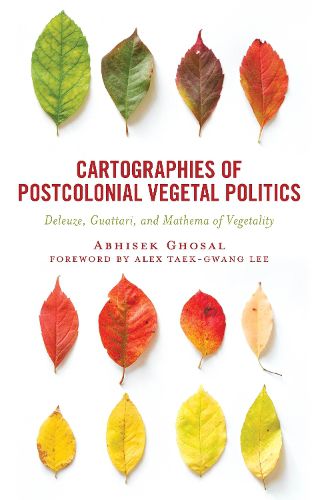Readings Newsletter
Become a Readings Member to make your shopping experience even easier.
Sign in or sign up for free!
You’re not far away from qualifying for FREE standard shipping within Australia
You’ve qualified for FREE standard shipping within Australia
The cart is loading…






Cartographies of Postcolonial Vegetal Politics takes a deep dive into the stratified and rigidly segmented territorialities of Plant Humanities or Critical Plant Studies. It strikes up an epistemic departure from the arboreal structures of 'plant-thinking' and subsequently lays out 'plant-becoming' in terms of ontophytological thinking revised in alignment with rhizomatics so as to critically design the discursive edifices of postcolonial vegetal politics-differential grammatology of which stands wedded to the production of the 'new' and thus understood to be able to position vegetality as event-in-(dis)order. Abhisek Ghosal emphasizes the profound importance of Deleuzo-Guattarian grammatologies in pulling up 'plant-becoming' from being subjected to a set of rigidly structured models of vegetality. It is by working out aleatory eventualities of postcolonial haecceities that 'structures' of vegetality constituting the intellectual rigour of Critical Plant Studies are tenably discarded to foreground 'n-1' becomings of vegetality-multiplicities of which can well be sensed by means of reckoning vegetality as deterritorial vector that can facilitate scholars to cartograph the eventual unfolding of postcolonial vegetal politics afresh.
$9.00 standard shipping within Australia
FREE standard shipping within Australia for orders over $100.00
Express & International shipping calculated at checkout
Cartographies of Postcolonial Vegetal Politics takes a deep dive into the stratified and rigidly segmented territorialities of Plant Humanities or Critical Plant Studies. It strikes up an epistemic departure from the arboreal structures of 'plant-thinking' and subsequently lays out 'plant-becoming' in terms of ontophytological thinking revised in alignment with rhizomatics so as to critically design the discursive edifices of postcolonial vegetal politics-differential grammatology of which stands wedded to the production of the 'new' and thus understood to be able to position vegetality as event-in-(dis)order. Abhisek Ghosal emphasizes the profound importance of Deleuzo-Guattarian grammatologies in pulling up 'plant-becoming' from being subjected to a set of rigidly structured models of vegetality. It is by working out aleatory eventualities of postcolonial haecceities that 'structures' of vegetality constituting the intellectual rigour of Critical Plant Studies are tenably discarded to foreground 'n-1' becomings of vegetality-multiplicities of which can well be sensed by means of reckoning vegetality as deterritorial vector that can facilitate scholars to cartograph the eventual unfolding of postcolonial vegetal politics afresh.